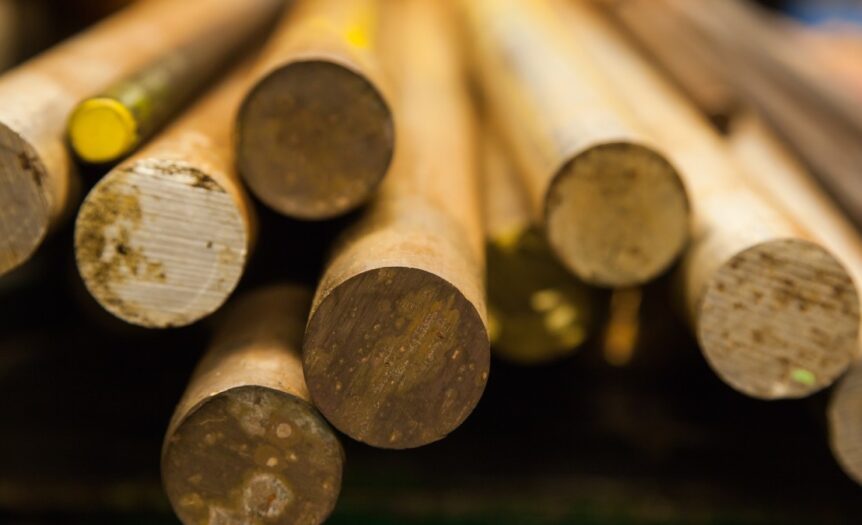Aluminum bronze alloys are renowned for their exceptional strength, corrosion resistance, and fatigue resistance, making them an ideal choice for a variety of industrial applications. The principal types of aluminum bronze combine the properties of aluminum with copper, and these alloys exhibit excellent thermal and electrical conductivity as well, which further enhances their versatility. Their unique characteristics allow these materials to perform reliably in challenging environments, from marine applications to intricate machinery.
Let’s look at five different uses for aluminum bronze alloys and how they contribute to the success of these applications.
Marine Applications
One of the primary uses for aluminum bronze alloys is in marine environments. The high resistance to seawater corrosion and biofouling makes these alloys well-suited for shipbuilding, offshore structures, and other maritime equipment. They are particularly useful in saltwater conditions where other materials would quickly deteriorate, making them a cost-effective choice in the long run. Additionally, their non-sparking properties make them suitable for electrical components on ships and oil rigs.
Aerospace Industry
The aerospace industry demands high-performance materials that can withstand extreme temperatures, pressures, and corrosive elements while remaining lightweight. Aluminum bronze alloys have excellent strength-to-weight ratios, making them a popular choice for aircraft and spacecraft components. They are also used in the production of landing gear and engine parts due to their high wear resistance.
Electrical Engineering
The thermal and electrical conductivity of aluminum bronze alloys makes them suitable for various electrical engineering applications. These alloys are frequently used in the manufacturing of connectors, terminals, and other high-stress electrical components that require both superior conductivity and durability. Their ability to withstand high temperatures without losing their properties makes these alloys suitable for use in power generation equipment, as well.
Industrial Machinery
Aluminum bronze alloys are often used in industrial machinery due to their exceptional strength and wear resistance. They are commonly found in gears, bearings, bushings, and other components that require a combination of strength and durability. These alloys are also used in mining equipment, paper mills, and chemical processing plants since they can withstand harsh conditions and heavy loads.
Architectural Applications
Due to its attractive golden-brown color and corrosion resistance, aluminum bronze is often used in architectural applications, such as building facades, handrails, and decorative elements. Its aesthetic appeal, combined with its high strength-to-weight ratio, makes it an excellent choice for both functional and decorative purposes.
The diverse properties of aluminum bronze alloys make them valuable materials in various sectors. Not only do they offer high strength and durability, but aluminum bronze alloys’ resistance to corrosion, wear, and extreme temperatures allows for a wide range of uses across multiple industries.









 Deering Estate
Deering Estate
 Massage Envy South Miami
Massage Envy South Miami
 Calla Blow Dry
Calla Blow Dry
 My Derma Clinic
My Derma Clinic
 Sushi Maki
Sushi Maki
 Sports Grill
Sports Grill
 The Healthy Kitchen
The Healthy Kitchen
 Golden Rule Seafood
Golden Rule Seafood
 Malanga Cuban Café
Malanga Cuban Café

 Kathleen Ballard
Kathleen Ballard
 Panter, Panter & Sampedro
Panter, Panter & Sampedro
 Vintage Liquors
Vintage Liquors
 The Dog from Ipanema
The Dog from Ipanema
 Rubinstein Family Chiropractic
Rubinstein Family Chiropractic
 Your Pet’s Best
Your Pet’s Best
 Indigo Republic
Indigo Republic




 ATR Luxury Homes
ATR Luxury Homes


 2112 Design Studio
2112 Design Studio
 Hamilton Fox & Company
Hamilton Fox & Company
 Creative Design Services
Creative Design Services
 Best Pest Professionals
Best Pest Professionals
 HD Tree Services
HD Tree Services
 Trinity Air Conditioning Company
Trinity Air Conditioning Company
 Cisca Construction & Development
Cisca Construction & Development
 Mosquito Joe
Mosquito Joe
 Cutler Bay Solar Solutions
Cutler Bay Solar Solutions


 Miami Royal Ballet & Dance
Miami Royal Ballet & Dance
 Christopher Columbus
Christopher Columbus
 Pineview Preschools
Pineview Preschools
 Westminster
Westminster
 Carrollton
Carrollton
 Lil’ Jungle
Lil’ Jungle
 Frost Science Museum
Frost Science Museum
 Palmer Trinity School
Palmer Trinity School
 South Florida Music
South Florida Music
 Pinecrest Orthodontics
Pinecrest Orthodontics
 Dr. Bob Pediatric Dentist
Dr. Bob Pediatric Dentist
 d.pediatrics
d.pediatrics
 South Miami Women’s Health
South Miami Women’s Health

 The Spot Barbershop
The Spot Barbershop
 My Derma Clinic
My Derma Clinic




 Miami Dance Project
Miami Dance Project

 Rubinstein Family Chiropractic
Rubinstein Family Chiropractic
 Indigo Republic
Indigo Republic

 Safes Universe
Safes Universe
 Vintage Liquors
Vintage Liquors
 Evenings Delight
Evenings Delight





 Atchana’s Homegrown Thai
Atchana’s Homegrown Thai
 Baptist Health South Florida
Baptist Health South Florida

 Laser Eye Center of Miami
Laser Eye Center of Miami
 Visiting Angels
Visiting Angels
 OpusCare of South Florida
OpusCare of South Florida

 Your Pet’s Best
Your Pet’s Best





 HD Tree Services
HD Tree Services
 Hamilton Fox & Company
Hamilton Fox & Company


 Creative Design Services
Creative Design Services